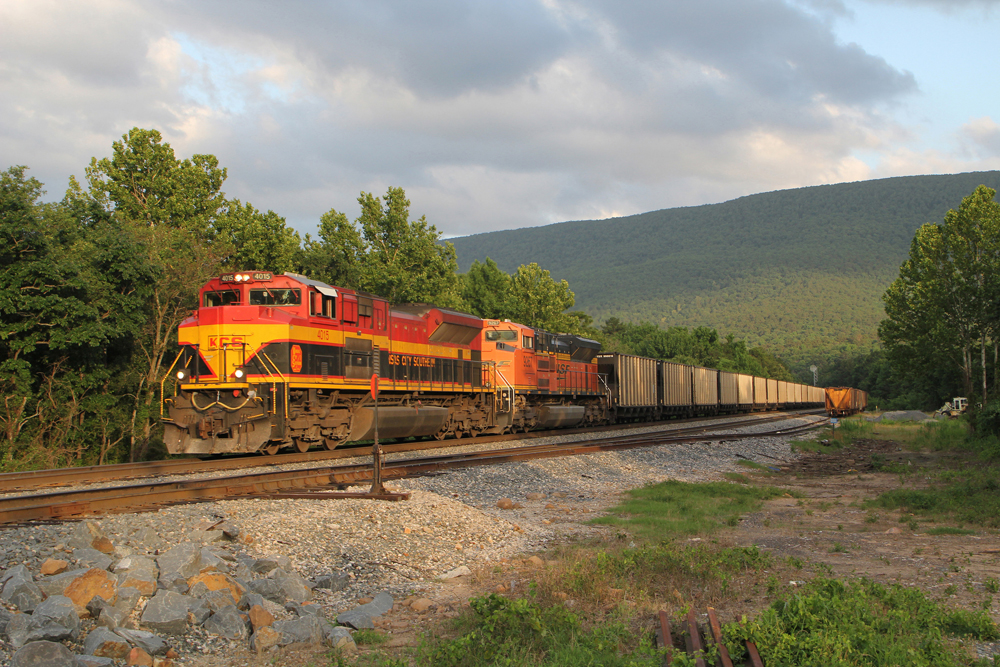
KANSAS CITY — With the recent announcement that Canadian Pacific is acquiring Kansas City Southern, railfans will no doubt be heading to the KCS to capture the last days of the smallest of the Class I railroads. But where should you go to catch the action on such a vast system? Here’s a few highlights, gleaned from KCS aficionados and fans.
Rich Mountain, Arkansas
At the heart of the original KCS south of Heavener, Okla., is Rich Mountain, a 45-mile crossing of the Ouachita Mountains and the summit of the most scenic portion of the Kansas City Southern north-south main line between Kansas City and Shreveport, La. This is wooded terrain, with no tunnels or substantial bridges, just curves and grades which slow trains down. The advantage is U.S. Route 59/70 parallels the grade for much of its distance, making photography relatively easy. The line is single track CTC with passing sidings. Coal trains that challenge the grades here use other railroads’ power, so to see KCS power look for manifest trains.
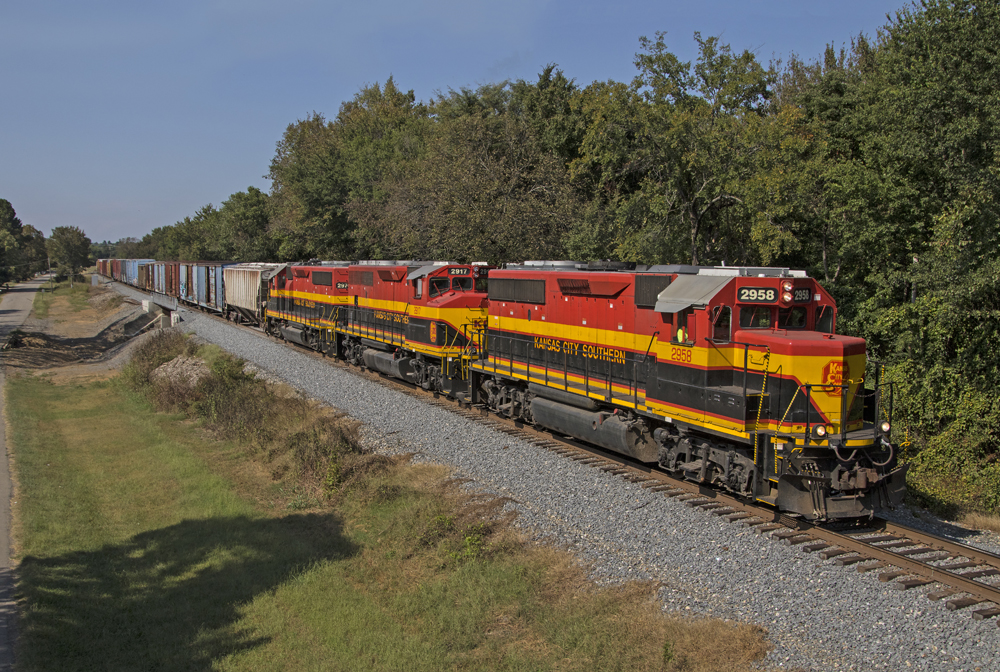
No. 2958 ex-SLSF 758 (GP40-2), built 5/79.
Fort Smith Dodger, Oklahoma
There are no worries about catching KCS power on branch-line trains, and if you’re in Heavener to catch action on Rich Mountain, an easy catch is the Fort Smith “Dodger” (the railroad’s term for a local). The Dodger departs Heavener on weekday mornings and heads up the Heavener Subdivision main line 12 miles north to Poteau, Okla., and then onto the 27-mile branch to Fort Smith, Ark. The line, which once belonged to the Frisco, also has a tunnel just south of the Arkansas state line, which is allegedly the only railroad tunnel in Oklahoma. Fort Smith offers other interesting highlights for photographers including the Fort Smith Railroad, which uses ex-Santa Fe GP20s, and the Arkansas & Missouri, which has Alcos for switching and interchange with the other railroads.
Huey P. Long Bridge, Louisiana
If large bridges are your thing, travel to Baton Rouge, La., to see the Huey P. Long Mississippi River Bridge. The 5,879-foot steel truss through deck bridge carries U.S. Highway190 with four traffic lanes, two on each side of KCS’ track. Opened in August 1940, this is the second Huey P. Long bridge over the Mississippi River and is configured similar to the Long Bridge in New Orleans, with long railroad trestles on either end of the bridge.
Meridian Speedway Bridge, Mississippi
Another KCS bridge can be found along the railroad’s “Meridian Speedway” at Vicksburg, Miss. The former Illinois Central bridge opened in 1930 and was added to the National Register of Historic Places in 1989. It also carried road traffic until 1998. The railroad passes under the parking lot of the Mississippi Welcome Center at the east end of the bridge, which provides an excellent vantage point to capture eastbound trains crossing the 8,546-foot bridge.
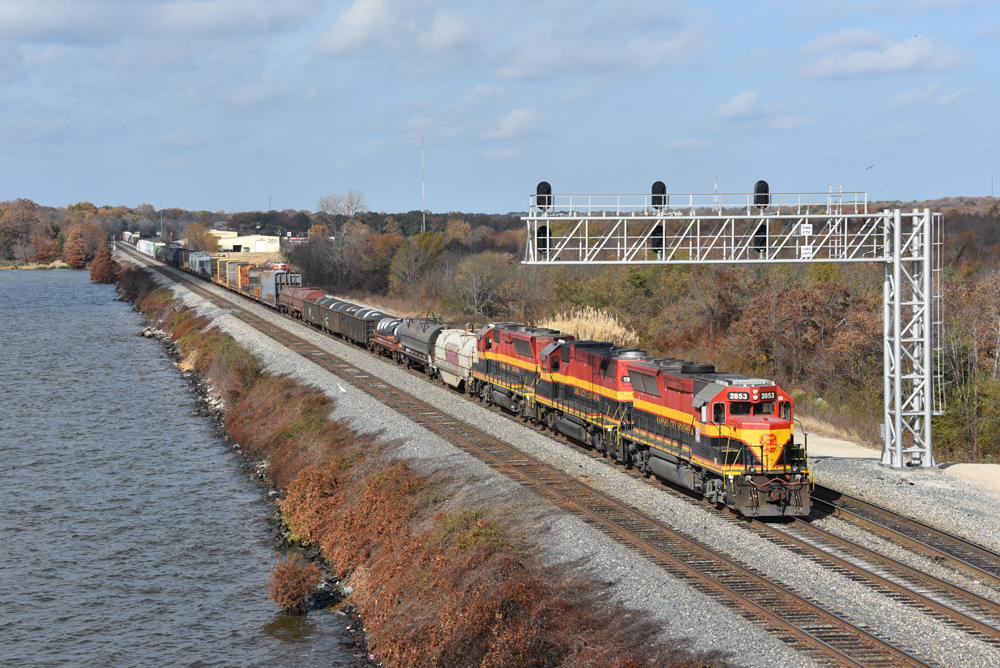
Shreveport, Louisiana
The “heart” of the original KCS is Shreveport, La. From there, KCS lines head west to Dallas/Fort Worth; east to Jackson and Meridian, Miss.; southeast to New Orleans; southwest to Lake Charles and Houston; and north to Kansas City. To handle all this traffic, KCS maintains the 257-acre Deramus Yard, a hump yard with 75 miles of track. In 2020, KCS announced a $50 million plan to expand the yard, but with Canadian Pacific’s aversion to hump yards and embrace of Precision Scheduled Railroading, it remains to be seen if Deramus will continue in its present form. With all the lines coming in and out of town, if you want to see lots of KCS action, Shreveport is the place to go.
F units, system-wide
The prize “catch” on KCS is its set of A-B-A F units that pull special trains. Of course, business trains don’t run on a set schedule, so it’s tough to catch one. But each December the railroad operates across its system the Holiday Express, which has traditionally been pulled by the Fs. The event, which brings Santa Claus and his elves to communities throughout KCS’ U.S. rail network in free, public events, also serves as a charitable fundraiser for the Salvation Army. It was cancelled in 2020 because of the pandemic, but with more vaccinations proceeding, hopefully life will be more normal by December and the Express can return. While many of the Holiday Express moves take place after dark, several ferry moves between display cities are in daylight, and KCS publishes the display schedule.
This hardly scratches the surface of KCS’ 6,700-mile network in the U.S. and Mexico, so there’s plenty of opportunity to catch this railroad in its last months of independent existence. See you trackside!






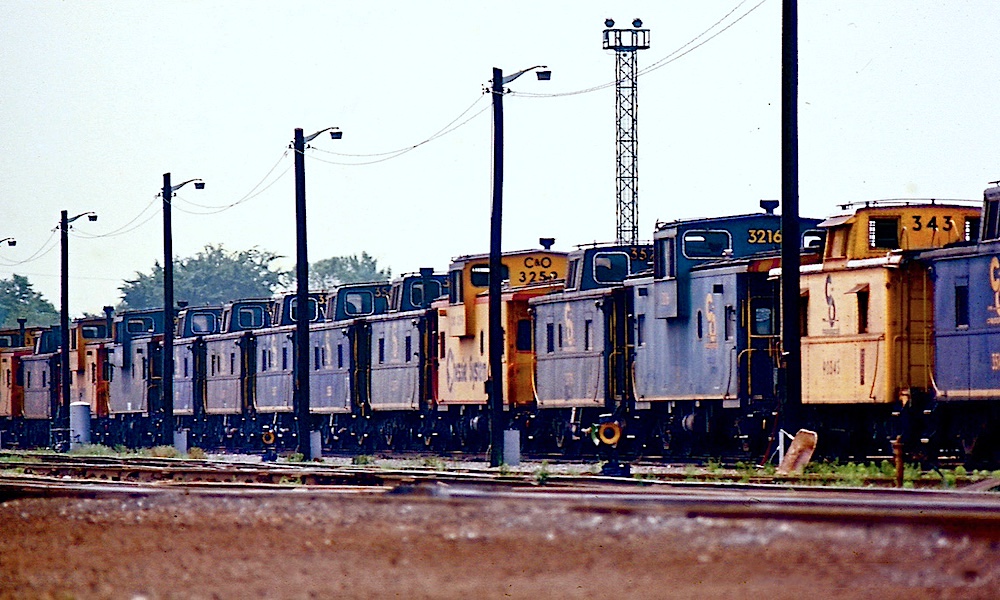
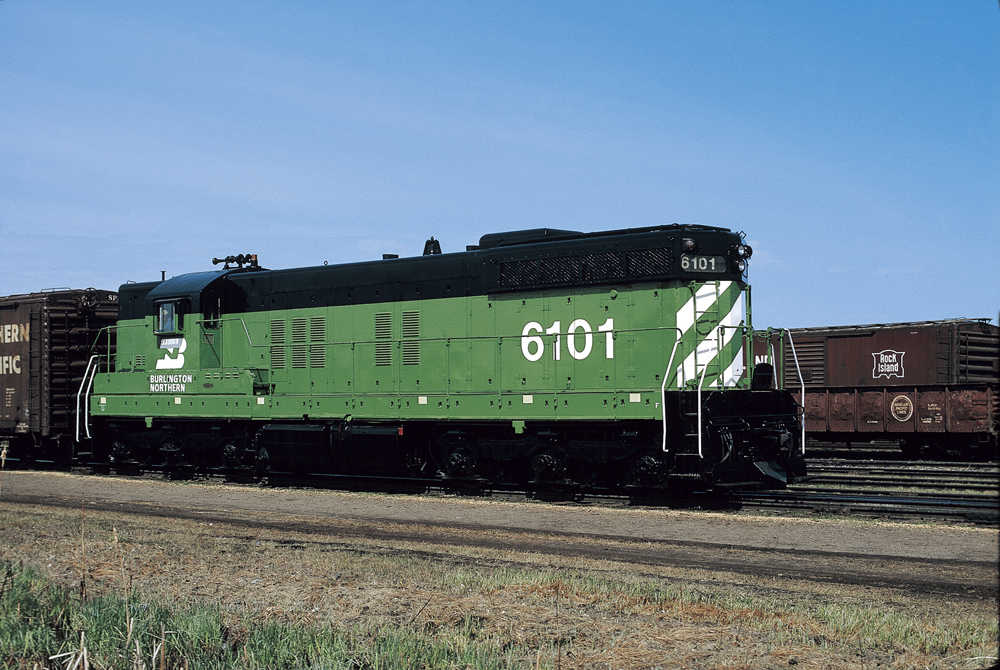
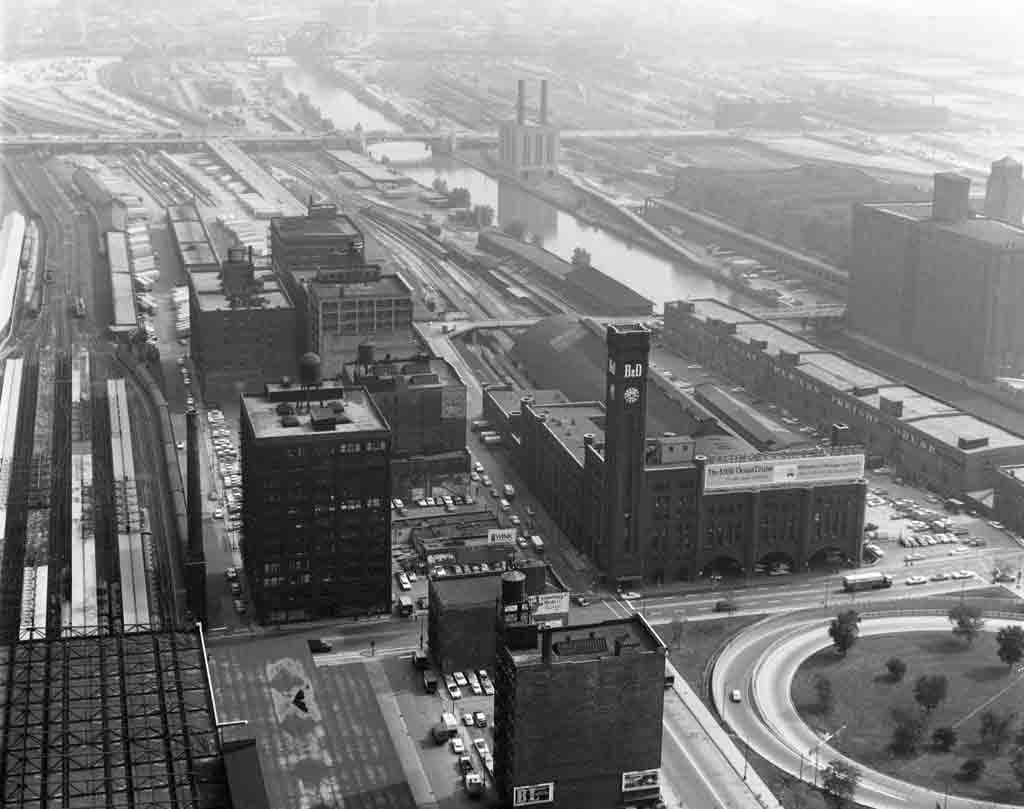
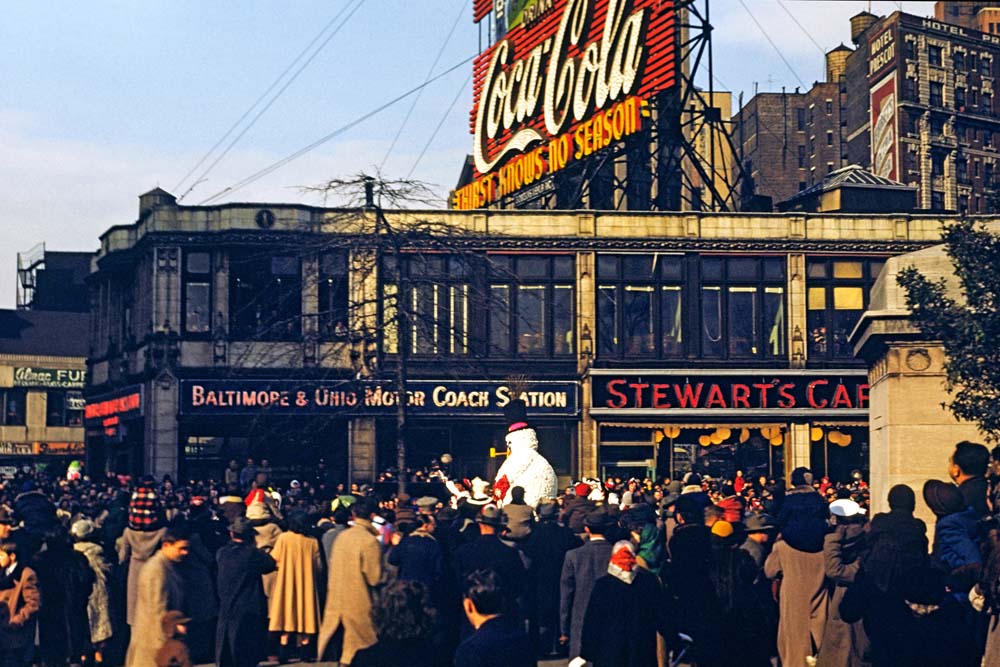




To see more pictures of KCS visit my website, trainbuff.net, album North American Railroads. My late friend had property at Howard, Arkansas which the KCS main line ran through. It took KCS trains about 45 minutes to climb Rich Mountain, plenty of time to put down your fishing rod and take pictures. We also spent time manning the old KCS depot in Mena, Arkansas which is full on KCS artifacts.
Don’t neglect the Heavener Sub between Stilwell OK and Neosho MO. It’s easily followed on US 59 from Stilwell to West Siloam Springs, then US 412 east through Siloam Springs, exit to Lincoln/Ark 59 south, going north on Lincoln-it’s also Ark 264-to Cheri Whitlock(Ark 43) east to Ark 59 north, which will follow the tracks into Missouri, where it will become MO 59, following the line up to Neosho. There are some scenic spots along the way, and plenty of places for gas and food. Easy chase, though you have to move along, and good access. Plus, you can check out the BNSF ex Frisco at Neosho.
I had put a post on here last night with some links on RRPA, but apparently it didn’t make it onto the site.
While it’s true that KCS does a lot of carload freight, the volumes are pretty high sometimes. The main from KC south also handles significant quantities of coal to several on line power plants, and grain to various points, and Mexico.
Southbound grain at Watts OK
http://www.rrpicturearchives.net/showPicture.aspx?id=5059198
H train working at Watts. They handle lots of grain for the feed mills on line. Chicken is a major business here-Tyson is based in Springdale Ark-and there is a lot of chicken feed made in the area. There is also a Little Debbie plant in Gentry Ark that gets grain and vegetable oil, and a pipe plant in Siloam Springs that gets plastic pellets.
http://www.rrpicturearchives.net/showPicture.aspx?id=4703324
Working Pipe Life in Siloam Springs
http://www.rrpicturearchives.net/showPicture.aspx?id=4232494
The Speedway seems to get the intermodal traffic, but the north south main does have relatively little. But it does exist:
Q train rolling into Watts
http://www.rrpicturearchives.net/showPicture.aspx?id=4759764
And rolling on through
http://www.rrpicturearchives.net/showPicture.aspx?id=4759770
We usually see one of these per day, usually late afternoon.
Anyway, while the area around Heavener and Rich Mountain get the attention, the rest of the Heavener Sub is also quite scenic in places, and fairly easy to follow from Stilwell OK to Neosho MO using US 59 to West Siloam Springs, then jumping over into Arkansas to follow Ark 59 north, becoming MO 59 when it crosses the state line north of Sulphur Springs.
Elk River at Ginger Blue
http://www.rrpicturearchives.net/showPicture.aspx?id=2370826
http://www.rrpicturearchives.net/showPicture.aspx?id=4534307
Along Butler Creek, just south of the Missouri line
http://www.rrpicturearchives.net/showPicture.aspx?id=2370752
http://www.rrpicturearchives.net/showPicture.aspx?id=4543591
Wolf Creek, between Gravette and Decatur Ark
http://www.rrpicturearchives.net/showPicture.aspx?id=4434780
http://www.rrpicturearchives.net/showPicture.aspx?id=2880635
On the Illinois River at Watts
http://www.rrpicturearchives.net/showPicture.aspx?id=4636541
Looking across the valley from old US 59 north of Westville OK
http://www.rrpicturearchives.net/showPicture.aspx?id=4636541
Come on down and see the KCS, before it looks a lot like this
http://www.rrpicturearchives.net/showPicture.aspx?id=4759760
interesting that in the article’s pictures, no intermodal, and two trains doing the osbsolete and unfashionable manifest gathering and distribution work.
And if you think KCS has a lot of manifest traffic, just wait until you look at KCSdeM! It’s like 1970 – just no cabooses.
If foreign countries can’t purchase our communication companies (radio & TV) how is it possible for them to acquire our transportation and trucking and air transport companies? Something sure as hell is wrong here! And who is getting the payoffs, Comrades? As we say — inquiring minds want to know.
CP and CN have long had a presence in America – CP thru its control of Soo Line
from Wikipedia: “June 11, 1888: The Canadian Pacific Railway acquires control of the Minneapolis, Sault Ste. Marie and Atlantic Railway, consolidating it with the Minneapolis and Pacific Railway, Minneapolis and St. Croix Railway, and Aberdeen, Bismarck and North Western Railway to form the Minneapolis, St. Paul and Sault Ste. Marie Railway. ”
and CN’s interest in GTW, DW&P, and GT. It’s hardly a new phenomenon.
And it would be hard to characterize Canada as an enemy working to control America’s vital railroads.
Deramus yard isn’t really a Hump … there’s no Crest or retarders. The yard takes advantage of the slope from the northwest [compass] end of the yard to the southeast to let cars roll into the bowl, with the lead switches remotely controlled.